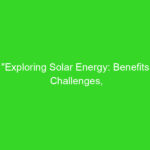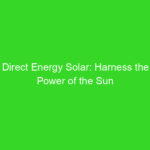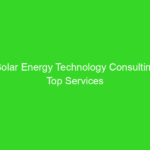
Solar Energy vs Nuclear Energy
As the world seeks to shift towards more sustainable forms of energy, the debate between solar and nuclear energy has become more prevalent. Both sources have their advantages and disadvantages, and it is essential to evaluate them before determining which source is more suitable for a given situation.
Solar Energy
Solar energy is a form of renewable energy derived from the sun. The energy is captured using photovoltaic (PV) cells and converted into electricity. Here are some of its advantages:
1. Renewable and Environmentally Friendly
Solar energy is one of the cleanest forms of energy available. It is renewable, and its production does not emit any harmful pollutants into the environment. This means that it does not contribute to air or water pollution and does not harm the ozone layer.
2. Long-Term Savings
Solar energy can help save money in the long run. Although installation costs can be high, solar panels can last up to 25 years. This means that after the initial investment, solar energy can provide free electricity for years to come.
3. Low Maintenance Costs
Solar panels require little to no maintenance. They have no moving parts and are designed to withstand harsh weather conditions. This means that they do not require any lubrication or repairs.
4. Scalable
Solar energy can be scaled up or down depending on the energy needs. Homeowners can install solar panels on their rooftops to power their homes, while large-scale solar farms can produce electricity for entire communities.
5. Easy Installation
Installing solar panels is a straightforward process. Most panels require no wiring, and the installation can be completed in a few hours.
Nuclear Energy
Nuclear energy is produced by nuclear reactors that harness the energy released by nuclear fission. The process involves splitting atomic nuclei, which releases large amounts of energy. Here are some of its advantages:
1. High Energy Density
Nuclear energy has a much higher energy density than other forms of energy. This means that a small amount of nuclear fuel can produce a large amount of energy.
2. Consistent Power Supply
Nuclear energy can provide a consistent power supply, unlike solar energy, which is dependent on weather conditions. Nuclear power plants can operate 24/7, providing a stable power supply.
3. Low Carbon Emissions
Nuclear energy does not emit any carbon dioxide into the atmosphere. This means that it does not contribute to global warming and has a smaller carbon footprint than fossil fuels.
4. Cost-Effective
Nuclear energy can be cost-effective in the long run. Although the initial investment can be high, the cost of nuclear fuel is relatively low. This means that the cost of generating electricity is low, resulting in cost savings over time.
5. High Energy Security
Nuclear energy provides high energy security since it does not rely on imports. Countries with nuclear power plants can generate their own electricity, reducing their reliance on other countries.
Conclusion
Both solar and nuclear energy have their advantages and disadvantages. Solar energy is renewable, environmentally friendly, low maintenance, scalable, and easy to install. On the other hand, nuclear energy has a high energy density, provides a consistent power supply, emits low carbon emissions, is cost-effective in the long run, and provides high energy security.
When choosing between solar and nuclear energy, it is essential to evaluate the specific energy needs, cost, environmental impact, and security concerns. Ultimately, the decision will depend on the circumstances and priorities of the situation.





